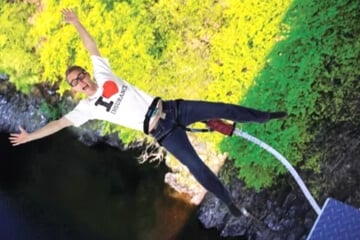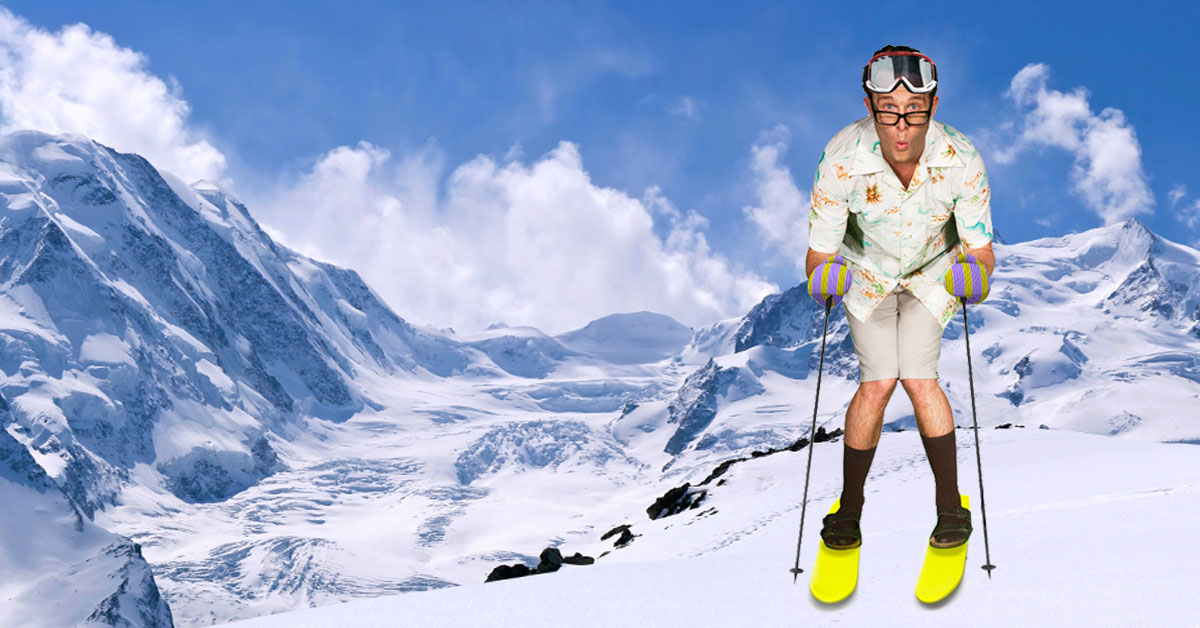Before you slap on the skis or charge the half pipe, make sure you have adequate cover for your trip. You've been itching all year long to hit the slopes and sink your skis into some fresh, white, powdery snow. You've got new gear, your accommodations are booked, you've scheduled some refresher courses with a local trainer and your bags have all been packed. Nothing can go wrong now, right?
Wrong!
Even though you've crossed every T and dotted every I, where your ski holiday is concerned, the best laid plans can fail. Err on the side of averages and assume that anything that can go wrong, will go wrong. But where would that leave you? Stranded in a foreign country with no luggage, flight accommodation? Or worse, out in the cold seeking emergency medical care from a ski injury without any money to pay for your treatment? These are the kinds of unfortunate circumstances that can be avoided by investing in a snow travel insurance policy.
According to ACC statistics, these are the most common ski accidents:
- 70% of accidents involve falls, and most falls happen as a result of loss of control. For example, a skier or snowboarder travelling too fast for the weather conditions or overestimating their ability.
- About 10% of accidents are caused by collisions with another person or object.
- 5% are lift-related
Lets get medical
So you've fallen off the ski lift and broken your leg. What next? Well the truth is the costs of expert medical attention, search parties, medical evacuation and an overseas hospital stay add up really fast. If you do come to grief, especially overseas, you don't want to be responsible for all those costs!
Ski insurance is a comprehensive type of cover. You'll have access to all the standard travel insurance benefits such as cancellation, lost or stolen belongings, personal liability, theft of cash and more, as well as cover for things such as piste closure and replacement of ski equipment.
So even if you have bad luck with a poor season or a lost pole, you don't have to compromise or cut your holiday short.
Compare and get the best ski insurance for the slopes
Due to their risky nature, partaking in extreme or winter sports are excluded by most policies. However, there are some ways around those exclusions - like adding a winter sports package to your current policy or taking out a ski holiday policy from a company that specialises in ski insurance. Be advised, though, that not all insurance policies are the same in terms of inclusions and exclusions so know ahead of time what you want and need coverage for before you begin your search. Doing your ski travel insurance comparison online can save you both time and money.
So, generally speaking, what's covered?
In addition to the usual stuff covered by a standard policy, a winter sports package will cover you for emergency evacuation from the slopes to nearest hospital, medical treatment, ski equipment hire, piste closure, bad weather and a little bit more.
Emergency Rescue and Medical Treatment - The cost of a medical evacuation off a snowy mountain overseas could cost you thousands of dollars. Most ski/snow policies will cover medical evacuation to the nearest hospital or depending upon the seriousness of the injury, back home to New Zealand. Of course, after the evacuation, the policy will also cover hospital and medical costs you incur while you are traveling outside of New Zealand.
Ski Equipment Hire and Reimbursement - Ski equipment is expensive to replace or repair if it gets lost, damaged or stolen. If your gear has a value of more than $700, most insurers will provide coverage protection for it, so long as the pieces are itemized on the policy. If you have to hire or rent additional equipment in the interim to replace yours during the remainder of your holiday, your policy might cover those fees as well. In the event that you're not able to use your ski and lift passes, hired equipment or purchased lessons due to illness, injury or theft - your policy will reimburse you the unused portion at no additional cost to you.
Bad Weather and Avalanche Closure - This clause of a ski/snow policy allows coverage for your out of pocket expenses in the event that you cancel your holiday or rebook at another location due to adverse weather conditions resulting in resort, slope and/or piste closure. If you don't have a special ski insurance policy, this will not be covered by the standard cancellation protection.
What's not covered?
- Losses Incurred While Under The Influence - Just as you shouldn't drink and drive, you shouldn't drink and ski, either. Not only is it extremely dangerous, but if the adjuster finds the losses you incurred happened while you were under the influence of alcohol or a similar substance.
- Ski equipment while in use - Most policies exclude cover forski equipment that is damage while it is being used. You'll still have cover for loss or theft of your gear though, as long as you haven't left it unattended or out of sight.
- Professional or competitive skiing - We do not now of any standard travel insurers in New Zealand that will cover professional skiing or snowboarding where you are racing or are competing in a competition or tournament.
- Older Skiers: You may be a grey haired globetrotter, but know that snow ski cover is typically restricted to those under 65 years of age.
- Out of Season Travel - Just because there's snow on the ground does not mean it's prime skiing time. Insurers have very strict guidelines about the time frames in which coverage is extended so make certain that your travel dates are well within their window of coverage.
- Out of Bounds - Typically you will not be covered for skiing in unpatrolled remote areas or unmarked slopes. A few specialist insurers will cover you off-piste provided you stay within resort boundaries. (The general definition being: Only covered when skiing within a short distance from designated areas of ski resort boundaries on groomed terrain or marked slopes or trails that are open, maintained or monitored and patrolled by the ski resort. Not covered outside resort boundaries.) So remember that ducking under the resort boundary ropes that have been closed all season for some back country skiing will not be covered and likely neither will any incidents that occur off-site from your destination.
- High risk activities - Most of these policies are geared toward people who plan to do recreational skiing and snowboarding only. The coverage usually does not extend to high risk activities such as cat skiing, competitive skiing, heli-skiing or bob sledding. The level of cover and exclusions on these activities varies between insurers, so be sure to read the Product Disclosure Statement (PDS) to ensure that your planned activities are on the 'covered' list. Some insurers will cover you for heli-skiing as long as you pay an addtional premium, and purchase at least 24 hours in advance.
Whether you're after an annual or a single ski insurance policy, comparetravelinsurance.co.nz is the quick and easy way to compare multiple ski quotes in seconds.
other articles you might like

Travel Insurance
Whether you’ve taken a spill on the sidewalk, been mugged in a market or picked up an exotic disease, our resident travel insurance guru Eugene Wylde can help to get you back on track quicker than you can say ‘happy holidays!’ with our ultimate guide to travel insurance.

Spousal skiing: coupled bliss from trail to piste
You know the feeling. Your ski-mad partner has begged and pleaded. You’re at the end of your tether and resistance is futile. It’s finally time to succumb to that dreaded ski trip!

What Adventure Activities Are Covered?
We know that relaxing on a beach isn’t everyone’s cup of tea. For the adventure junkies amongt us, it’s important to think about your planned activities and understand what is and isn’t covered.

Our Travel Insurance Comparison Helps You Save Time, Worry And Loads Of Money!
Stay up to date with our latest news, deals and special offers.







